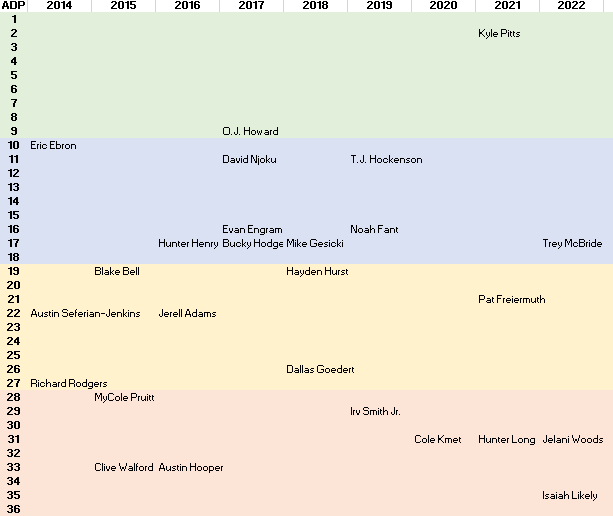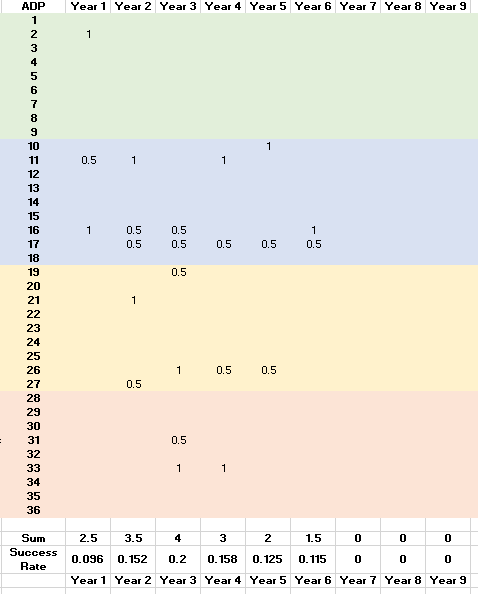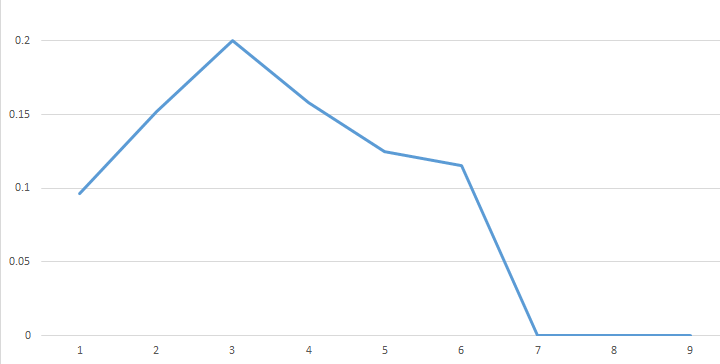In Part 4 of his 5-part series, Leonard LaPadula, explores TE success rate vs ADP and provides you his strategies for efficiently strengthening your TE position.
RC Intro: Leonard LaPadula is the founder of Advanced Sports Logic, and a long-time friend and colleague of mine. You may know his work as the creator of the DFS Optimizer (that uses FFM for number projections) or way back with the ahead-of-its-time Dynasty/Fantasy software 'The Machine' (which is planned for a comeback/redesign upgrade in the near future! Good news for 'Machine' fans!). Leonard was one of the FFM original customers back in FFM's infancy and has been with FFM for all his Dynasty/Fantasy teams for over a decade. Leonard has some unique, data-driven thoughts about how to manage his Dynasty teams and he shares them in published articles from time-to-time. He thought this report might be of interest to the FFM community, so I'm glad to post his thoughts/data here.
Introduction of the Study
This article is an analytical analysis of dynasty rookie TE draft picks, comparing average draft position (ADP) with success rate. It is the 4th part of a five part series, which includes:
- How To Add A QB1 To Your Dynasty Team
- How To Add An RB1 To Your Dynasty Team
- How To Add A WR1 To Your FF Dynasty Team
I do these analyses for managing my own dynasty football team. I have learned a lot from these studies and it is helping me make decisions in my Dynasty Fantasy Football team.
The QB analysis destroyed my long-held belief, that top QBs have the longest NFL longevity of the fantasy football relevant positions. I was shocked to see that generally they peak in year two and decline after that. I also discovered that there seems to a successful band by ADP of QB picks in the 2.07 to 3.03 range.
And I found that RBs have a very pronounced drop off after year six.
I didn't find anything quite so surprising with respect to WRs.
If I were to summarize my findings with respect to TEs in a single word it is "dartboard". But that would make this article short and boring so let's dive in.
Historical ADP Information
Based on historical ADP information, this is where tight ends were drafted over the last nine years:

Now here is the shocking part. These are the notable tight ends that had a rookie-year ADP below the 3rd round in the last 9 years and have been top-6 TEs at least once: Mark Andrews, George Kittle, Tyler Higbee, Darren Waller, Logan Thomas. Here are additional tight ends that have been TE1s that fell below the 3rd round in their Dynasty Rookie Draft: Taysom Hill, Dalton Schultz, Juwan Johnson and Dawson Knox.
What about Travis Kelce and Rob Gronkowski? They are not part of this study because they entered the NFL league prior to 2014 and I don't have the ADP data any further back. However, they are the prototypical example of what we are looking for - a top-6 TE that lasts a decade - and are proof that this type of TE can exist, albeit they are very rare.
I believe the randomness of the success for tight ends is because of the variation of how they are used. A top TE for the NFL is measured first for their run and pass blocking. The ability for a TE to run routes and catch are the icing on the cake. So, a top-6 TE isn't top-6 because of their skillset alone, but also based heavily on the offensive scheme, their quarterback's preferences, game planning and game situation. Receivers and running backs primary purpose is to pick up yards, blocking is secondary, so an RBs or WRs skillset generally correlates better with fantasy points than for a TE. We get TE fantasy points on only from a secondary skillset of a TE for NFL purposes. The rare exception is that special TE that is the best guy on the team for getting red zone touch downs (and spiking the ball like Gronk).
Therefore, from a fantasy perspective top NFL tight ends can lurk below the radar for years, then seemingly pop-up out of nowhere because they changed teams or head coaches and the offensive scheme changed. And then just as easily they can fall back into obscurity when the scheme or quarterback changes again.
Success Rate vs Years of Experience
The next step in my analysis is to see how these players panned-out since being drafted. In my analyses of the different position, I have valued the top 12 QBs, the top 24 RBs and top 36 WRs based on my league's starting lineup requirements. For TEs, I value just the top 12, with a value of 1 for a top-6 and a value of 0.5 for 7th through 12th.
Then I took the integral of their results and got this chart:

Only one TE drafted in the last 9 years with an ADP in the first three rounds was a top-6 TE two years in a row, Austin Hooper with an ADP of 33 (pick 3.09) and no TE was a TE1 for more than 3 years in a row. The TE1s showing up at ADP of 17 is a combination of Hunter Henry (rookie in 2016) and Mike Gesicki (rookie in 2018). Otherwise you can see the top TEs poke in and out in different years.
The valuable information pops out in the last row. It shows the success rate versus years of experience.
Generally, TEs seem to improve over the first three years, and then start a slow decline.
Next I put this information into graphical form:

Again, the focus of this article is to help you decide how to use your draft picks in a dynasty rookie draft and I don't have ADP data going back more than 9 years, so this chart doesn't include Rob Gronkowski, Travis Kelce, Mark Andrews, George Kittle, Tyler Higbee, Darren Waller, etc. And for the purpose of deciding if you will use a pick on a TE it is valuable.
Let's finish breaking down draft value versus ADP.
Checkout our FREE Premium Articles
- RC's Daily Notes 2025: For the Week of 12/22-28 (SUN. Yest. Games React, Injuries, Weather)
- RC's Daily Notes 2025: For the Week of 12/15-12/21 (The Week That Was...)
- NFL Draft 2023 Scouting Report: WR Michael Wilson, Stanford (REPRINT from 2023/FREEVIEW)
- 2025 Preseason Wk 3 Game Report: Bears 29, Chiefs 27
- Post-NFL Draft Podcast Appearance with RC and The Podfather




